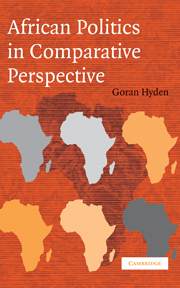Book contents
- Frontmatter
- Contents
- Acknowledgments
- 1 The Study of Politics and Africa
- 2 The Movement Legacy
- 3 The Problematic State
- 4 The Economy of Affection
- 5 Big Man Rule
- 6 The Policy Deficit
- 7 The Agrarian Question
- 8 Gender and Politics
- 9 Ethnicity and Conflict
- 10 The External Dimension
- 11 So What Do We Know?
- 12 Quo Vadis Africa?
- References
- Index
7 - The Agrarian Question
Published online by Cambridge University Press: 05 September 2012
- Frontmatter
- Contents
- Acknowledgments
- 1 The Study of Politics and Africa
- 2 The Movement Legacy
- 3 The Problematic State
- 4 The Economy of Affection
- 5 Big Man Rule
- 6 The Policy Deficit
- 7 The Agrarian Question
- 8 Gender and Politics
- 9 Ethnicity and Conflict
- 10 The External Dimension
- 11 So What Do We Know?
- 12 Quo Vadis Africa?
- References
- Index
Summary
Social exchange theory, as discussed in Chapter Four, posits that power is manifest in relations between people. It is the interdependence thus created that generates the possibility of exercising power. The more symmetrical these relations are the less likely that they will be perceived as one person exercising power over the other. The more asymmetrical they are, however, the more probable that the persons involved in these relations will subjectively perceive them in terms of power. As suggested already, relations between people can be formal or informal. The more formal they are, the more corporate their character is likely to be. What determines these relations, in other words, are the roles people play rather than their own personal attributes or character. For instance, relations of power in an organization are constituted by the hierarchy of positions contained in the organogram. A regulation or contractual agreement certifies who can tell whom what to do and who in the end has the ultimate responsibility for what is decided and done. The more informal these relations are, the more personal their nature. As previous chapters have indicated, relations between people in African society tend to be highly personalized. For instance, power relations are constituted by patrons linking up with clients. Furthermore, more symmetrical relations are also informally constituted in response to needs of individuals and households, for example, pooling labor or saving money in small groups.
- Type
- Chapter
- Information
- African Politics in Comparative Perspective , pp. 138 - 161Publisher: Cambridge University PressPrint publication year: 2005

